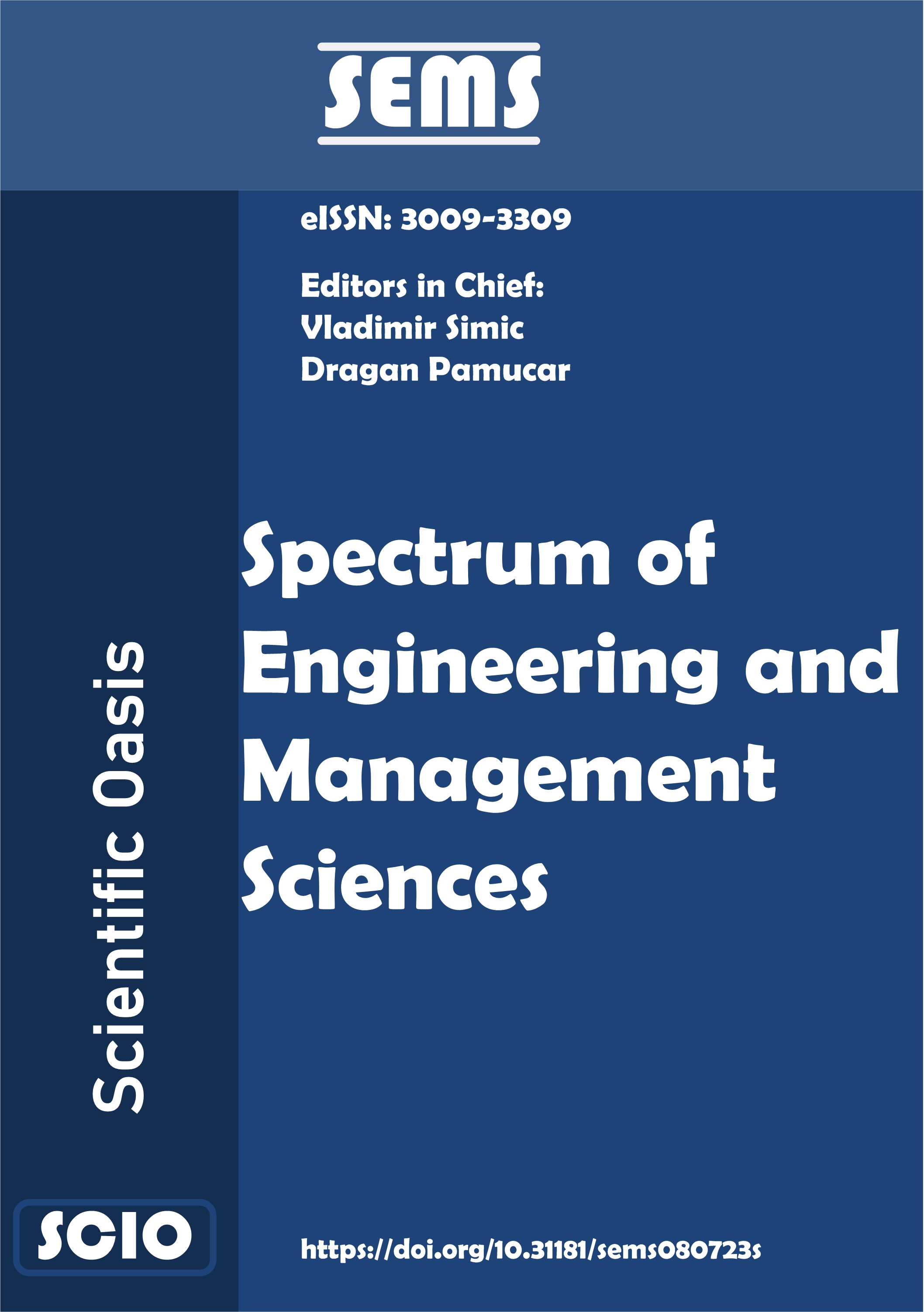Decision-Making for the Bakery Product Transportation using Linear Programming
DOI:
https://doi.org/10.31181/sems1120235aKeywords:
Transportation problem, decision-making, operational NWCM research model, optimal solution, various analytical methods (VAM), Analytical MethodsAbstract
This research paper presents a case study of a food chain in Pakistan that aims to transport its bakery products from the manufacturing unit in Islamabad to remote northern regions of the country while minimizing the total cost of distribution and transportation. The study employs various analytical methods, including linear programming, network optimization, and simulation modelling, to identify the optimal transportation solution that considers geographical barriers, infrastructural limitations, seasonal fluctuations, and regulatory constraints. The research delves into the underlying factors that contribute to the complexity and challenges of delivering goods to remote areas and explores the potential benefits of adopting a more holistic and integrated approach to transportation management. The study provides valuable insights and actionable recommendations for the Pakistani food chain and contributes to the broader field of transportation and logistics management.
References
Christopher, M. (2016). Logistics and Supply Chain Management (5th ed.). Pearson.
Coyle, J. J., Langley, C. J., Novack, R. A., & Gibson, B. (2016). Supply chain management: A logistics perspective (10th ed.). Cengage Learning.
Langley, C. J. (2016). The state of logistics outsourcing: 2016 Third-Party Logistics Study. Capgemini Consulting, Penn State University, and Penske Logistics.
Vidal, C. J., & Goetschalckx, M. (1997). Strategic production-distribution models: A critical review with emphasis on global supply chain models. European Journal of Operational Research, 98(1), 1-18. https://doi.org/10.1016/S0377-2217(96)00397-2.
Ahuja, R. K., Magnanti, T. L., & Orlin, J. B. (2014). Network flows: Theory, algorithms, and applications. Prentice Hall.
Waters, D. (2010). Global logistics: New directions in supply chain management (6th ed.). Kogan Page.
Notteboom, T., & Rodrigue, J. P. (2009). The future of containerization: Perspectives from maritime and inland freight distribution. GeoJournal, 74(1), 7-22. https://doi.org/10.1007/s10708-008-9187-9.
Stank, T. P., Goldsby, T. J., Vickery, S. K., & Savitskie, K. (2015). Logistics service providers: An empirical examination of the size-efficiency relationship. Journal of Business Logistics, 25(2), 179-201. https://doi.org/10.1002/j.2158-1592.2004.tb00177.x.
Aven, T. (2016). Risk assessment and risk management: Review of recent advances on their foundation. European Journal of Operational Research, 253(1), 1-13. https://doi.org/10.1016/j.ejor.2015.12.023.
Seuring, S., & Müller, M. (2008). From a literature review to a conceptual framework for sustainable supply chain management. Journal of Cleaner Production, 16(15), 1699-1710. https://doi.org/j.jclepro.2008.04.020.
Crainic, T. G., & Laporte, G. (2013). Planning models for freight transportation. European Journal of Operational Research, 97(3), 409-438. https://doi.org/10.1016/S0377-2217(97)00177-1.
Nagurney, A. (2010). Supply chain network design: Optimization models, methodologies, and applications. International Journal of Production Economics, 128(1), 1-12. https://doi.org/10.1016/j.ijpe.2010.07.025.
Mentzer, J. T., Min, S., & Bobbitt, L. M. (2001). Toward a unified theory of logistics. International Journal of Physical Distribution & Logistics Management, 31(2), 99-121. https://doi.org/10.1108/09600030110385815.
Rushton, A., Oxley, J., & Croucher, P. (2014). The handbook of global supply chain management. Sage Publications.
Halldórsson, Á., & Kovács, G. (2010). The sustainable agenda and energy efficiency: Logistics solutions and supply chains in times of climate change. International Journal of Physical Distribution & Logistics Management, 40(1/2), 5-13. https://doi.org/10.1108/09600031011020432.
Abioye, O. F., Dulebenets, M. A. M., Kavoosi, Pasha, J., & Theophilus, O. (2019). Vessel Schedule Recovery in Liner Shipping: Modeling Alternative Recovery Options. IEEE Transactions on Intelligent Transportation Systems, 22(10), 6420-6434. https://doi.org/10.1109/TITS.2020.2992120.
Dulebenets, M. A. (2019). Minimizing the total liner shipping route service costs via application of an efficient collaborative agreement. IEEE Transactions on Intelligent Transportation Systems, 20(1), 123-136. https://doi.org/10.1109/TITS.2018.2794998.
Chinedum, O. (2018). Port congestion determinants and impacts on logistics and supply chain network of five African ports. Journal of Sustainable Development of Transport and Logistics, 3, 70-82. https://doi.org/10.14254/jsdtl.2018.3-1.7.
Gumuskaya, V., van Jaarsveld, W., Dijkman, R., Grefen, P., & Veenstra, A. (2020). A framework for modelling and analysing coordination challenges in hinterland transport systems. Maritime Economics & Logistics, 22, 124-145. https://doi.org/10.1057/s41278-019-00139-1.
Loch, G. V. & Silva, A. C. L. D. (2014). A Computational Study on the Number of Iterations to Solve the Transportation Problem. Applied Mathematical Sciences, 8, 4579-4583. https://doi.org/10.12988/ams.2014.48958.
Kumaraguru, S., Kumar, S. B., & Revathy, M. (2014). Comparative Study of Various Methods for Solving Transportation Problem. International Journal of Scientific Research, 3(9), 244-246. https://doi.org/10.15373/22778179/september2014/81.
Verma, V., & Puri, M. C. (2022). On a paradox in linear fractional transportation problems. In Recent developments in mathematical programming (pp. 413-424). CRC Press.
Afroz, S. & Hassan, M. B. (2015). A Computer Oriented Method for Solving Transportation Problem. Dhaka University Journal Science, 63(1), 1-7. https://doi.org/10.3329/dujs.v63i1.28216.
Bera, R.K., Mondal, S.K. (2020). Analyzing a Two-Staged Multi-objective Transportation Problem Under Quantity Dependent Credit Period Policy Using q-fuzzy Number. International Journal of Applied and Computational Mathematics, 6, 146. https://doi.org/10.1007/s40819-020-00901-7
Rao, K. C. & Mishra, S. L. (2005). Operations Research. Alpha Science International.
Sen, S., Sahoo, L., Tiwary, K., Simic, V., & Senapati, T. (2023). Wireless Sensor Network Lifetime Extension via K-Medoids and MCDM Techniques in Uncertain Environment. Applied Sciences, 13(5), 3196. https://doi.org/10.3390/app13053196.
Kacher, Y., & Singh, P. A. (2021). Comprehensive Literature Review on Transportation Problems. International Journal of Applied and Computational Mathematics, 7, 206. https://doi.org/10.1007/s40819-021-01134-y.
Taha, H. A. (2007). Operations Research: An Introduction (8th ed.). University of Arkansas, Fayetteville.
Panneerselvam, R. (2006). Operations Research (2nd ed.). Prentice-Hall of India Private Limited.
Ajibade, A. D. & Babarinde, S. N. (2013). On the Use of Transportation Techniques to Determine the Cost of Transporting Commodity. International Organization of Scientific Research Journal of Mathematics, 6(4), 23-28. https://doi.org/10.9790/5728-0642328.
Gupta, P. K. & Hira, D. S. (2005). Operations Research. Chand & Company Ltd, New Delhi.
Liu, C. H. & Trung, L. L. (2013). The Study of Using Linear Programming to Solve Flower Transport Problem. Journal of Convergence Information Technology, 8(8), 1116-1124. https://doi.org/10.4156/jcit.vol8.issue8.133.
Ali, U. A. & Mustafa, A. M. (2013). Comparisons of Transportation Algorithms Using Data from Katsina State Transport Authority, Katsina State, Nigeria. Nigerian Journal of Basic and Applied Science, 21(3), 201-214. https://doi.org/10.4314/njbas.v21i3.17.
Srinivasan, G. (2010). Operations Research Principles and Applications (2nd ed.). PHI Learning Private Limited, New Delhi.
Rodrigue, J. P. (2020). The Geography of Transport Systems (3rd ed.). Routledge.
Downloads
Published
Issue
Section
License
Copyright (c) 2023 Scientific Oasis

This work is licensed under a Creative Commons Attribution-NonCommercial-NoDerivatives 4.0 International License.













